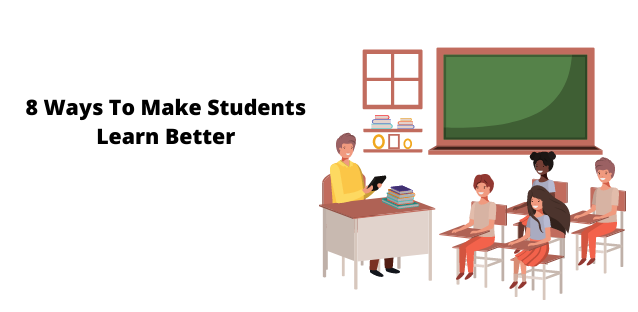Tutoring is a noble profession. You get to educate youthful minds and try to nurture them into thriving grown-ups. But it can also be relatively grueling if you ’re caught off guard. Tutoring scholars with different literacy capacities and attention spans isn’t a walk in the demesne. So, if you’re going to come a schoolteacher, you need to make learning a more wholesome experience for your scholars. Doing so will help scholars learn better and insure you meet your tutoringobjectives.However, we ’ve listed a many tips below, If you ’re wondering how to help scholars learn better.
Use humor
Using humor in lectures is a great way to make scholars learn better. It helps to keep scholars interested and engaged in the else dull course material. So incorporate funny stories and data into your assignment plan. Also, laughing at yourself and your miscalculations can help you develop a fellowship with your scholars. This will make them more willing to hear to you, and remembering information will come easier.
Treat every pupil else
Every pupil is unique. They’ve unique literacy capacities and requirements. And it’s essential to know how your scholars best absorb information. Scholars with literacy disabilities tend to grasp information slower than others. Thus, you must produce a class that’s inclusive of every pupil’s literacy needs. Incorporate different literacy styles into your tutoringstyle.However, you may be at an advantage, If you ’ve done an MEd in Special Education Administration. But you can always take help from your associates and coffers on the internet to design a class suited to everyone’s requirements.
Be friendly
Scholars witness a considerable quantum of pressure currently. Parents frequently have high prospects for them. They might also feel pressure to get good grades because they want to get into a good council. Keeping up with peer pressure can also be delicate. So, try being further friendly towards them. Insure they feel comfortable and relaxed during class. Helping them relieve some of their particular and academic stress in the classroom can help to ameliorate their literacy issues.
Produce intriguing assignments
Intriguing assignments won’t only keep them busy, but will also make them learn better. Assignments don’t have to be worksheets that ask the scholars to write down answers. Rather, you can assign some creative and instigative tasks to give your scholars a taste of how delightful it’s to learn new effects. To make schoolwork intriguing for your pupil, ask questions beyond what’s tutored in class. Encourage them to probe and suppose out of the box. You can also assign group tasks so that scholars learn from their peers. Group assignments aren’t only delightful. They also help to develop cooperative and platoon- structure chops that will come in handy in the future.
Do fun conditioning
Scholars learn stylish when they’re interested in the subject matter. While this may feel egregious, numerous parents and preceptors overlook this abecedarian principle ofeducation.However, they’re doubtful to want to do it, If scholars don’t see an academic exertion as instigative or precious. Using a variety of fun conditioning can help scholars remember motifs they’re learning. This will make them want to come back to class to learn further and have fun at the same time. Preceptors should always be on the lookout for new and instigative ways to stimulate different types of literacy in their classes. You might find that some scholars prefer hands-on conditioning. In discrepancy, others learn better from part- playing or conversations. So produce a balance.
Use illustrations
The mortal brain learns better from filmland than from plain words. Hence, incorporating visual content in your course material can make a huge difference in learning issues. It improves retention as well as engagement. So, educate via videotape and visual donations. You can use platforms similar as YouTube and SlideShare to your advantage. Simplify complex textbook- grounded content with easy-to- understand plates and maps. Visual cues will help scholars learn better.
Arrange field visits
Field Passages help scholars connect with the real world other than home, academy, and their circle of musketeers. These passages are a fin way to make literacy more practical and engaging. Scholars can see how the effects they ’re learning about apply in the real world. They will be suitable to come back with stories about what happed during their visit, encouraging them to pay attention. So, add field passages to places like galleries, public premises, manufactories,etc., during the semester. You can also give them delightful assignments like a photography competition or a videotape talkie donation to make the experience further fun.
Introduce liar
Liar is among the most effective ways to engage scholars. You can use a story to explain situations and use it to break problems. The stylish way to integrate stories into assignments is by using an illustration. Exemplifications are generally direct stories with characters, plot, conflict, setting, etc. They can be real- life situations or grounded on fabrication books. A good story in calculation class can help scholars learn more effectively than taking the traditional, dry approach. It’ll help them understand the assignment more, remember it longer, and apply it rightly in other analogous situations. The questions that follow a story should be related to the story itself or have some connection with it. This will allow scholars to concentrate more on answering them rather of going off track on unconnected motifs.
Conclusion
The pupil- schoolteacher relationship is an essential component in the form for success in achieving learning objects. And there’s also no denying that literacy has evolved over the periods. By chancing ways to make scholars learn better, both preceptors and scholars can profit in the long run. So, integrate a many of the tips mentioned over into your tutoring style. You may find your scholars retaining information more snappily and suitable to suppose more critically in the future.
